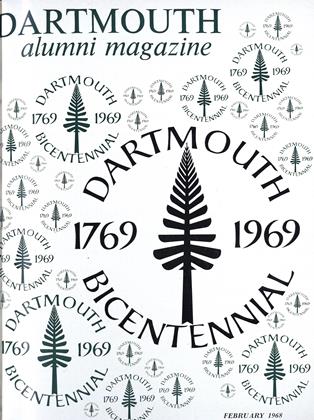In a concerted action against the October Selective Service directive that would make military service a punishment for students engaging in protest demonstrations against recruiting or the draft, the eight presidents of the Ivy League colleges sent a joint letter to President Johnson on December 21. President Kingman Brewster Jr. of Yale, currently chairman of the group, wrote:
DEAR MR. PRESIDENT:
We, the Presidents of the so-called Ivy Group Colleges and Universities, had hoped that the joint statement by the Attorney General and the Director of Selective Service indicated that there was no intention on your part to permit 4,000 local draft boards to pass upon the illegality of acts of demonstration against military recruitment and selective service.
General Hershey's subsequent off-the-cuff statement dashed this hope. We urgently implore you to make it crystal clear that there is no intention to use induction as a punishment, that there is no intention to let local boards assume the judicial role of determining the legality of individual conduct, and that there is no intention to undercut or bypass fundamental judicial processes.
We cannot overemphasize the importance of upholding the spirit and the letter of Constitutional assurance of due process of law. We realize, as you do, the threat of spreading civil disobedience, and would support any lawful effort to assure the orderly processes of recruitment and selection for military service. However, these immediate concerns as well as the fundamental values of due process of law will remain in serious jeopardy unless you make it clear that the draft is not to be used as a punishment and that draft boards are not to become extralegal judges of the legality of acts of protest.
The White House authorized the release of President Brewster's letter and the reply from Special Presidential Assistant Joseph A. Califano Jr., who agreed with the principle of due process of law supported by the Ivy League presidents. Significantly, the exchange was released also to draft boards throughout the country.
 View Full Issue
View Full Issue
More From This Issue
-
 Feature
FeatureThe Classic Tradition of Judaism
February 1968 By JACOB NEUSNER -
 Feature
FeaturePlans Are Progressing for the Big Year
February 1968 -
 Feature
FeatureWhat It's All About
February 1968 By Robert B. Reich '68 -
 Feature
FeatureTrustees Meet with Alumni Council
February 1968 -
 Feature
FeatureNovelist on the Go
February 1968 -
 Feature
FeatureA Special Teacher
February 1968
Article
-
 Article
ArticleCourage of Conviction
April 1924 -
 Article
ArticleHALLGARTEN ADOPTED BY UNION CLUB FOR QUARTERS
NOVEMBER 1927 -
 Article
ArticleNew York State Leads In Men Enrolled
February 1933 -
 Article
ArticleWith the Big Green Teams
APRIL 1967 -
 Article
ArticleAnd The Envelope Please
September 1992 -
 Article
ArticleHanover Browsing
June 1941 By HERBERT F. WEST '22

